GARDENS BY THE BAY
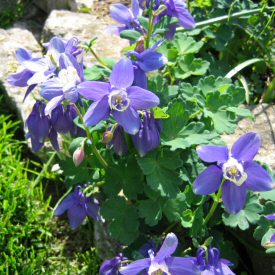
HUMMINGBIRD-FRIENDLY PERENNIALS & THEIR COMPANIONS
Hummingbirds generally prefer brightly coloured flowers with a lot of rich nectar to provide the much-needed energy they require. Unlike bees and butterflies, hummingbirds possess a long bill that can penetrate deep into long, tubular flowers where such nectar resides. In return for this food source, hummingbirds provide the pollination required by the flowers they visit. The plants that attract hummers have little or no scent. Hummingbird-friendly plants are often red, generally blooming for a longer period of time than other flowers. Their flowers will be spaced far enough apart to provide access for the hummingbird while his wings are in rapid motion. And the bloom will take place in daylight - no night-blooming wonders here.
I read recently that there are at least 150 North American flowering plants that seem specialized to attract hummingbirds. What works in one area however may not do so in another. So you must do some research into what plants will work best in your area. Start by considering some of those shown below along with the plants that will complement them and may do double duty in bringing hummingbirds to your gardens.
* Watch for the animated hummingbird and butterfly with the plants that attract them. *
The deer icon indicates plants that deer are not usually attracted to.
   The best time and method to propagate plants can be found on our image-intensive PROPAGATION page.
To help your plants grow their best, check out our FERTILIZATION page.
To create your own plant partnerships based on tried and true color theory, check out our GARDEN COLOR page.
To see if a particular plant is on this page press Ctrl+F, type in the name, then click the Find button.
The best time and method to propagate plants can be found on our image-intensive PROPAGATION page.
To help your plants grow their best, check out our FERTILIZATION page.
To create your own plant partnerships based on tried and true color theory, check out our GARDEN COLOR page.
To see if a particular plant is on this page press Ctrl+F, type in the name, then click the Find button.
AGASTACHE
   Wonderful colour, beautiful form and heady aroma are all attributes of the Hyssop genus. Plants will attract birds, bees, butterflies and hummingbirds with their nectar-rich flowers. Hummers are highly attracted to plants with red, orange or pink flowers. Blue flowers are especially attractive to butterflies.
Agastache foeniculum: in general, profuse bloom into the fall season
Wonderful colour, beautiful form and heady aroma are all attributes of the Hyssop genus. Plants will attract birds, bees, butterflies and hummingbirds with their nectar-rich flowers. Hummers are highly attracted to plants with red, orange or pink flowers. Blue flowers are especially attractive to butterflies.
Agastache foeniculum: in general, profuse bloom into the fall season
uses: mixer or filler in summer and fall borders, in containers, flower arrangements
combined with other long-blooming perennials: Salvia verticillata 'Purple Rain', S. x 'Scarlet Spires',
S. guaranitica 'Argentine Skies'
with: Nepeta sibirica 'Souvenir d'Andre Chaudron', Nepeta racemosa 'Walker's Low'
with: Achillea i.e. 'Summer Pastels', 'Feuerland' or 'Anblo'
with: Origanum 'Rosenkuppel' (Ornamental Oregano), Kniphofia i.e. 'Little Maid', 'Bees' Sunset', 'Strawberries and Cream'
in front of perennials with gray foliage: Artemisia 'Powis Castle'
for contrast against silver-foliaged plants: Perovskia 'Longin' (silvery-white stems)
for contrast in front of burgundy foliage: Euphorbia dulcis 'Chameleon', Aster lateriflorus 'Lady in Black'
with clumping ornamental grass: Helictotrichon sempervirens, Pennisetum setaceum 'Rubrum' (copper-red)
to complement a companion herb: Rosmarinus officinalis 'Tuscan Blue'
with fall-blooming perennials: Aster laevis 'Bluebird', Aster oblongifolius 'Raydon's Favorite',
Aster novae-angliae 'Purple Dome', Solidago rugosa 'Fireworks'
in pots or containers with: annuals and tender perennials such as Solenostemon (Coleus)
There are many species and cultivars to choose from, in a variety of colours, most of which will look wonderful with any of the combinations suggested above. The forms below are just a few to watch for. For images of variously-coloured forms of this perennial visit the North Creek Nurseries site, then scroll down to the Agastache section.
- A. foeniculum 'Fragrant Delight': seed strain, 20-40", white, blue, red, yellow or pink, foliage scented like anise,
peppermint, spearmint or licorice
- Agastache x 'Blue Fortune': powder-blue flowers, deep green foliage, 36"x18", mid-summer bloom, dry to medium soil,
- Agastache nepetoides: Giant Yellow Hyssop, 5-6'x18"
- Agastache rugosa 'Golden Jubilee': the first chartreuse-foliaged form, 24-36", soft blue flowers, sun to part shade,
mid to late summer bloom, for mid-border, self-seeds "true"
- Agastache rugosa 'Honey': 3', silvery-green foliage, attracts goldfinches, blue flowers
- Agastache rugosa 'Honey Bee Blue': 24-36"x18-24", intense blue flowers, gray-green foliage
- Agastache rupestris: Sunset Hyssop, 15", sun to part shade, mid-summer to fall bloom,
thread-like gray-green foliage, provide rich, well-drained soil
- Agastache rupestris 'Apache Sunset': 20", bright orange flowers, aromatic gray foliage
For even more forms of Hyssop, follow the link to the Hardy Plants site. Once there, click on the Seeds A link, then the genus Agastache, and delight in all the possible choices.
ALCEA
 The perfect cottage garden plant, the Hollyhock is considered a biennial or short-lived perennial. Good air circulation is a must, although protection from wind is also essential. Hollyhocks are best closely spaced, 2 to 3 feet apart. Top dress the site in spring with compost, manure or a balanced organic fertilizer. Water deeply only in dry weather. At other times excess water can be fatal.
Alcea: Hollyhock The perfect cottage garden plant, the Hollyhock is considered a biennial or short-lived perennial. Good air circulation is a must, although protection from wind is also essential. Hollyhocks are best closely spaced, 2 to 3 feet apart. Top dress the site in spring with compost, manure or a balanced organic fertilizer. Water deeply only in dry weather. At other times excess water can be fatal.
Alcea: Hollyhock
synonym: Althaea
where: at rear of borders, along fences or walls
behind: Paeonia
beside: Echinops ritro, Digitalis
behind bushy perennials: Platycodon grandiflorus
Alcea rosea: white
behind: Achillea filipendulina 'Gold Plate'
For Hollyhocks of various other colours, follow the links below.
AQUILEGIA
 The early-blooming flowers of the Columbine provide a rich nectar source for hummingbirds in late spring to early summer when few other sources are available in the garden. Although short-lived, from 2 to 4 years in good garden conditions, they add a definite charm wherever they are planted. In full sun plants will be more robust, will provide more bloom and remain more compact. In partial shade expect flowers to last longer due to the protection the shade provides from heat. When the base of older plants becomes woody and blooms are reduced in number it is time to replace with new young plants.
Aquilegia alpina: Alpine Columbine, bright blue
Aquilegia alpina 'Hensol Harebell': Blue Columbine, deep lavender-blue
The early-blooming flowers of the Columbine provide a rich nectar source for hummingbirds in late spring to early summer when few other sources are available in the garden. Although short-lived, from 2 to 4 years in good garden conditions, they add a definite charm wherever they are planted. In full sun plants will be more robust, will provide more bloom and remain more compact. In partial shade expect flowers to last longer due to the protection the shade provides from heat. When the base of older plants becomes woody and blooms are reduced in number it is time to replace with new young plants.
Aquilegia alpina: Alpine Columbine, bright blue
Aquilegia alpina 'Hensol Harebell': Blue Columbine, deep lavender-blue
note: this is a long-lived form
with: most of the rose-coloured June-blooming perennials
Aquilegia: Columbine
where : in dappled shade at woodland edges
with : spring wildflowers, ferns, Hosta spp.
with : Heuchera, Helleborus, Phlox divaricata
with : Iberis, Dicentra, Iris, Lupinus, Papaver, Mertensia virginica
behind: clumps of taller ferns, to hide leaf miner damage to basal foliage i.e. Aquilegia canadensis 'Corbett' (pale yellow)
behind Dryopteris erythrosora
above trio with : Arum italicum 'Pictum' (winter-spring) & Pulmonaria (spring-summer)
Aquilegia: long-spurred & taller species
note: plant in clumps or drifts among other plants
interspersed with: Iris, Paeonia, Geranium spp.
Aquilegia: deep purple forms
with: Lychnis viscaria (gorgeous contrast between the vibrant pink & the deep purple)
Aquilegia: Dragon Fly Hybrids; mixed colours, under 2' tall
where: filted shade
with: Iberis, Dicentra
Aquilegia Spring Song Hybrids : 30" in mixed colours
combined with : Azalea (behind) & Wild Blue Phlox (in front)
Aquilegia canadensis: Wild Columbine, Canadian Columbine, red & yellow, especially attractive to hummingbirds
Aquilegia flabellata 'Blue Angel': Japanese Fan Columbine
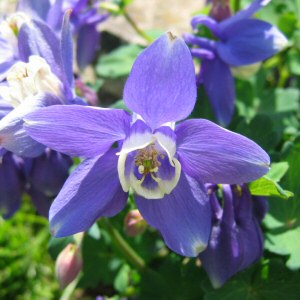
this short-statured beauty is in the border around this page and the images at the top of the page and directly above
Aquilegia x hybrida: Hybrid Columbine, 2-3'x12"
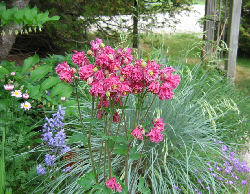
seen above beside Blue Oat Grass, with Spanish Bluebells, light pink Pyrethrum & Solomon's Seal nearby
where : in groups or drifts, light shade, along stone walls, rock gardens
with spring and early-summer perennials : Tulipa, Narcissus, wildflowers, ferns
with: Hosta, bearded Iris, Nepeta x faassenii, Lupinus, Papaver orientale
Aquilegia x hybrida 'Biedermeyer': 10-16"x12-14"
note: always plant in groups of three or more
around base of tall, shrubby perennials: Amsonia, Baptisia, Aconitum, Delphinium
with : Iberis, Dicentra, Papaver, Astilbe arendsii 'Deutschland', Linum perenne
with: Campanula lactifolia (lilac-coloured)
with spring perennials: Geranium, .Oenothera, Iris, Paeonia, Lupinus
Aquilegia x McKana Giants: 30-36"x18"
with: Astilbe arendsii 'Deutschland'
in front of: Iris (yellow), Campanula lactifolia (lilac)
behind: Astilbe & Linum perenne
Aquilegia 'Blue Butterflies': 6" dwarf, purplish-blue, white-edged
where: border edge, rock gardens, containers
Aquilegia 'Nora Barlow': 2-3' double, mix of red, pink, green
around base of tall, shrubby perennials: Amsonia, Baptisia, Aconitum, Delphinium
with: Paeonia
with: spring perennials, late bulbs
with: Geranium, Oenothera, Iris, Paeonia, Lupinus
For Columbines of various other colours, follow the links below.
BUDDLEIA
 
 The summer to fall blooms of Butterfly Bush will bring not only butterflies but also hummingbirds to your garden. It is considered a perennial in the north, where it grows to a height of 5-8 feet, and a shrub in the south where growth may reach 10-15 feet. Buddleia davidii prefers full sun as well as rich, mist, well-drained soil. On the other hand Buddleia alternifolia performs well in poor, sandy soil. Feed your plant in spring with a balanced organic fertilizer or a top-dressing of compost or well-rotted manure. Dead-head most types to prolong bloom.
Buddleia: Butterfly Bush
The summer to fall blooms of Butterfly Bush will bring not only butterflies but also hummingbirds to your garden. It is considered a perennial in the north, where it grows to a height of 5-8 feet, and a shrub in the south where growth may reach 10-15 feet. Buddleia davidii prefers full sun as well as rich, mist, well-drained soil. On the other hand Buddleia alternifolia performs well in poor, sandy soil. Feed your plant in spring with a balanced organic fertilizer or a top-dressing of compost or well-rotted manure. Dead-head most types to prolong bloom.
Buddleia: Butterfly Bush
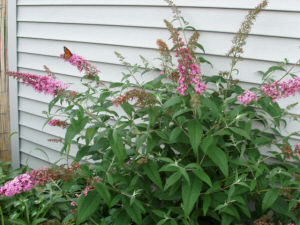
combined with: other butterfly-attracting plants in informal meadow plantings
with summer and fall-blooming plants: Aster, Helenium, Echinacea purpurea, Ornamental Grasses
underplanted with: ground covers
a dynamite combination with: Echinacea purpurea, Echinacea purpurea 'White Swan' & Liatris
You can find Butterfly Bushes of various colours by following the links below.
HEUCHERA
  Although hummingbirds are drawn to the flowers of the hybrid Coral Bells, it is the foliage that may provide the most interest to a gardener. Be sure to divide your plants every 2-3 years to keep them vigorous. Use for borders, edging or even as cut flowers. Accoring to Heritage Perennials Perennial Gardening Guide, Heuchera sanguinea is "best for edging purposes, blooming slightly before most other types". Bloom may start in May for this type and in June for the hybrid forms.
Although hummingbirds are drawn to the flowers of the hybrid Coral Bells, it is the foliage that may provide the most interest to a gardener. Be sure to divide your plants every 2-3 years to keep them vigorous. Use for borders, edging or even as cut flowers. Accoring to Heritage Perennials Perennial Gardening Guide, Heuchera sanguinea is "best for edging purposes, blooming slightly before most other types". Bloom may start in May for this type and in June for the hybrid forms.
There are numerous forms of Coral Bells on other pages of this site. Follow the links below to find companions for variously-coloured or sized specimens.
LOBELIA
 My American Horticultural Socity FLOWER FINDER reference book describes the plant below as "red as a cardinal's feathers". This wildflower prefers shade or semi-shade with moist, humusy soil. Lobelias demand sustained moisture for peak performance. Blooms will appear in late summer to fall.
Lobelia cardinalis: bright red
My American Horticultural Socity FLOWER FINDER reference book describes the plant below as "red as a cardinal's feathers". This wildflower prefers shade or semi-shade with moist, humusy soil. Lobelias demand sustained moisture for peak performance. Blooms will appear in late summer to fall.
Lobelia cardinalis: bright red
where: wet spots, poolside, along streams
with: Iris, Hosta, Ligularia, ferns
in front of: Cimicifuga racemosa
with: Coreopsis grandiflora 'Sunburst', Iris x germanica
Lobelia siphilitica: does not attract hummingbirds
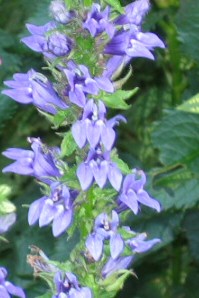
where: moist, sunny areas, along ponds & streams
with bold foliage plants: Ligularia dentata, Hosta, Chelone obliqua, ferns
with: Iris x germanica, Iris sibirica, Iris ensata, Astilbe
with moisture-lovers: Hemerocallis, Tradescantia, Phlox paniculata, Helenium
with yellows: Lilium, Linum flavum
LUPINUS
 Lupines bloom in erect spikes of pea-like flowers in a variety of colours, including pink, red, purple shades, yellows and white. They thrive in cool, moist summers, rather than the hot and humid ones in our area where they suffer. Provide them with full sun to light shade and rich, moist, well-drained soil for best performance.
Lupinus: Lupine
Lupines bloom in erect spikes of pea-like flowers in a variety of colours, including pink, red, purple shades, yellows and white. They thrive in cool, moist summers, rather than the hot and humid ones in our area where they suffer. Provide them with full sun to light shade and rich, moist, well-drained soil for best performance.
Lupinus: Lupine
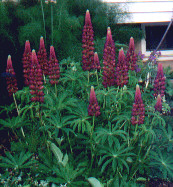
where: deep rich soil, well-drained, neutral to acidic
behind: something that grows large enough to hide them
with: Paeonia
with: Aquilegia, Linum perenne, Campanula persicifolia (purple forms)
with: Delphinium x elatum, Eremurus x isabellinus 'Shelford Hybrids' (4-8')
for shape contrast with: Iris x germanica (Bearded Iris)
combined with: Achillea x 'Moonshine' & Hemerocallis 'Golden Gift'
Lupinus Russell Hybrids: separate or mixed colours
with: flowering shrubs, Iris, Paeonia, Campanula
behind: crimson Dianthus barbatus
Lupinus polyphyllus: Washington Lupine
with: Aquilegia, Geranium, Campanula, Iris, Paeonia
You will find information about Lupines of other colours by following the link below.
PENSTEMON
 Beard-Tongue is the common name for these native North American wildflowers. Tubular flowers are a sure way to bring hummingbirds flocking, and the flowering spikes of Penstemon are no exception. If you can provide full sun and well-drained soil then these are certainly for you. Many are perfect for rock garden use.
Division every four years or so is necessary for vigour. Keep the inner portions and discard the older outer portions. For those wanting to try propagation by seed, a visit to Tom Clothier's Seed Germination Methodology page will provide full instructions for dozens of species within the genus.
Penstemon: Beardtongue
Beard-Tongue is the common name for these native North American wildflowers. Tubular flowers are a sure way to bring hummingbirds flocking, and the flowering spikes of Penstemon are no exception. If you can provide full sun and well-drained soil then these are certainly for you. Many are perfect for rock garden use.
Division every four years or so is necessary for vigour. Keep the inner portions and discard the older outer portions. For those wanting to try propagation by seed, a visit to Tom Clothier's Seed Germination Methodology page will provide full instructions for dozens of species within the genus.
Penstemon: Beardtongue
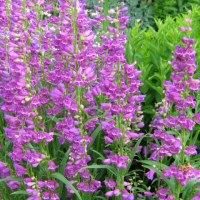
with: perennial Geranium spp., Tradescantia, Achillea, Oenothera, Stachys, Yucca, Ornamental Grasses
Penstemon fruticosus 'Purple Haze': sub-shrub, UBC
where: over banks or walls, as edger, in rock gardens
Find Beard-Tongue of other colours by following the link below.
SALVIA
  The genus, Sage, is a very diverse group encompassing annuals, biennials, perennials, herbs, shrubs and sub-shrubs with tubular, often brightly-coloured flowers as well as aromatic foliage. What more could a hummingbird want. Their needs are simple - full sun and fertile, well-drained soil.
Follow the links below for information about numerous Salvia forms.
The genus, Sage, is a very diverse group encompassing annuals, biennials, perennials, herbs, shrubs and sub-shrubs with tubular, often brightly-coloured flowers as well as aromatic foliage. What more could a hummingbird want. Their needs are simple - full sun and fertile, well-drained soil.
Follow the links below for information about numerous Salvia forms.
purple Salvia forms
white Salvia forms
yellow Salvia forms
Salvia with silver foliage
Salvia with variegated foliage
For a plant profile with everything you need to know to grow it well, follow the link to Salvia 'East Friesland'.
All of our own Gardens By The Bay pages can be accessed by clicking on the links below.
HOME
GARDEN POETRY |
GARDEN POETRY MUSE
GEORGIAN BAY VIEW
BOTANICAL LATIN - BASICS
COLOR THEORY
THE GARDENS
CORNER GARDEN CONSTRUCTION |
CORNER GARDEN PLANTING |
LONG GARDEN
EAST GARDEN |
HOSTA GARDEN |
NORTH GARDEN |
WINTER GARDENS
PLANT PARTNERSHIPS
BLUE PERENNIALS Aconitum -
Geranium |
Iris - Vinca
BULBS Allium - Hyacinthus |
Narcissus only |
Tulipa only |
Minor Bulbs
BUTTERFLY MAGNETS Anaphalis - Hemerocallis |
Liatris - Veronicastrum
 DAYLILIES Spider & Unusual Form DAYLILIES Spider & Unusual Form EDGERS Arabis - Iris |
Nepeta - Veronica
FOLIAGE PERENNIALS
Alchemilla - Tanacetum
HOSTA Hosta - all
HUMMINGBIRD-FRIENDLY PERENNIALS Alcea - Salvia
ORANGE PERENNIALS Achillea - Tulipa
ORNAMENTAL GRASSES Acorus - Imperata |
Miscanthus - Spodiopogon
PINK PERENNIALS Achillea - Lilium |
Lychnis - Veronica
PURPLE PERENNIALS Aconitum - Liatris |
Polemonium - Veronica
RED PERENNIALS Achillea - Veronica
SHADE PERENNIALS Aegopodium - Erythronium |
Ferns - Polemonium |
Polygonatum - Vinca
SILVER FOLIAGE PERENNIALS
Achillea - Cerastium
|
Cornus - Limonium
|
Lunaria - Veronica
SIMPLY SPECIAL PERENNIALS Acanthus - Saxifraga
WHITE PERENNIALS Achillea - Iris |
Kalimeris - Yucca
YELLOW PERENNIALS Achillea - Hypericum |
Inula - Verbascum
VARIEGATED-FOLIAGE PERENNIALS Acorus - Erythronium |
Hakonechloa - Lysimachia |
Miscanthus - Yucca
PLANT PROFILES
Dianthus 'Tiny Rubies' |
Geranium |
Geum coccineum |
Kerria japonica |
Knautia macedonica
Paeonia tenuifolia |
Papaver somniferum |
Rudbeckia |
Salvia 'East Friesland'
Trollius |
Veronica 'Sunny Border Blue'
PROPAGATION
DIVISION - SPRING ONLY |
DIVISION - FALL ONLY |
DIVISION - SPRING OR FALL |
DO NOT DIVIDE
FERTILIZATION
EDGERS Arabis - Iris |
Nepeta - Veronica
FOLIAGE PERENNIALS
Alchemilla - Tanacetum
HOSTA Hosta - all
HUMMINGBIRD-FRIENDLY PERENNIALS Alcea - Salvia
ORANGE PERENNIALS Achillea - Tulipa
ORNAMENTAL GRASSES Acorus - Imperata |
Miscanthus - Spodiopogon
PINK PERENNIALS Achillea - Lilium |
Lychnis - Veronica
PURPLE PERENNIALS Aconitum - Liatris |
Polemonium - Veronica
RED PERENNIALS Achillea - Veronica
SHADE PERENNIALS Aegopodium - Erythronium |
Ferns - Polemonium |
Polygonatum - Vinca
SILVER FOLIAGE PERENNIALS
Achillea - Cerastium
|
Cornus - Limonium
|
Lunaria - Veronica
SIMPLY SPECIAL PERENNIALS Acanthus - Saxifraga
WHITE PERENNIALS Achillea - Iris |
Kalimeris - Yucca
YELLOW PERENNIALS Achillea - Hypericum |
Inula - Verbascum
VARIEGATED-FOLIAGE PERENNIALS Acorus - Erythronium |
Hakonechloa - Lysimachia |
Miscanthus - Yucca
PLANT PROFILES
Dianthus 'Tiny Rubies' |
Geranium |
Geum coccineum |
Kerria japonica |
Knautia macedonica
Paeonia tenuifolia |
Papaver somniferum |
Rudbeckia |
Salvia 'East Friesland'
Trollius |
Veronica 'Sunny Border Blue'
PROPAGATION
DIVISION - SPRING ONLY |
DIVISION - FALL ONLY |
DIVISION - SPRING OR FALL |
DO NOT DIVIDE
FERTILIZATION
BULBS |
ORNAMENTAL GRASSES |
PERENNIALS |
SHRUBS |
VINES
LINKS
GARDENS |
LOCAL GARDENS |
BOTANICAL TERMINOLOGY
GARDENING BOOKS |
NON-GARDENING
HOME
|
|
|